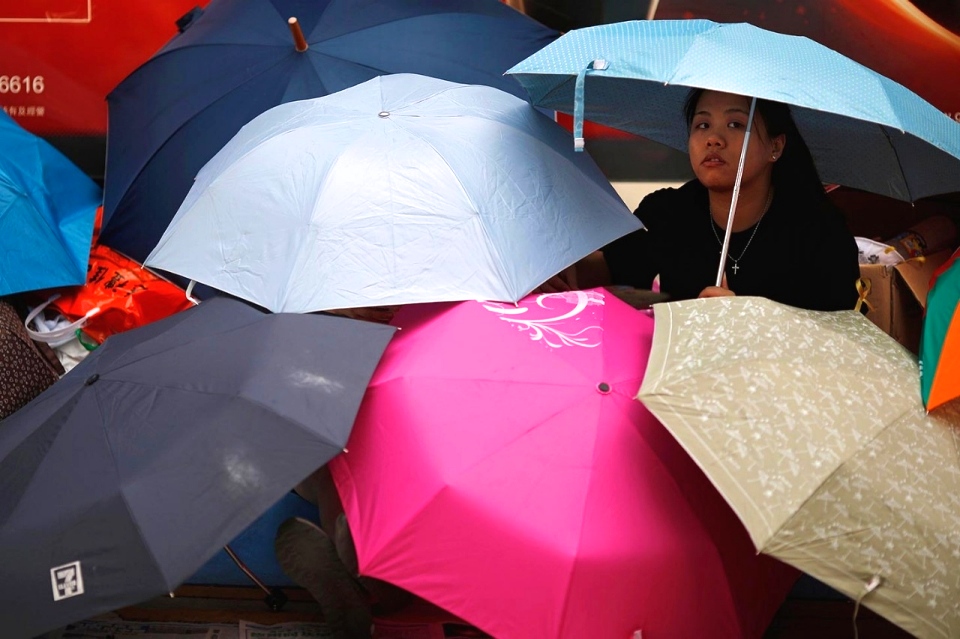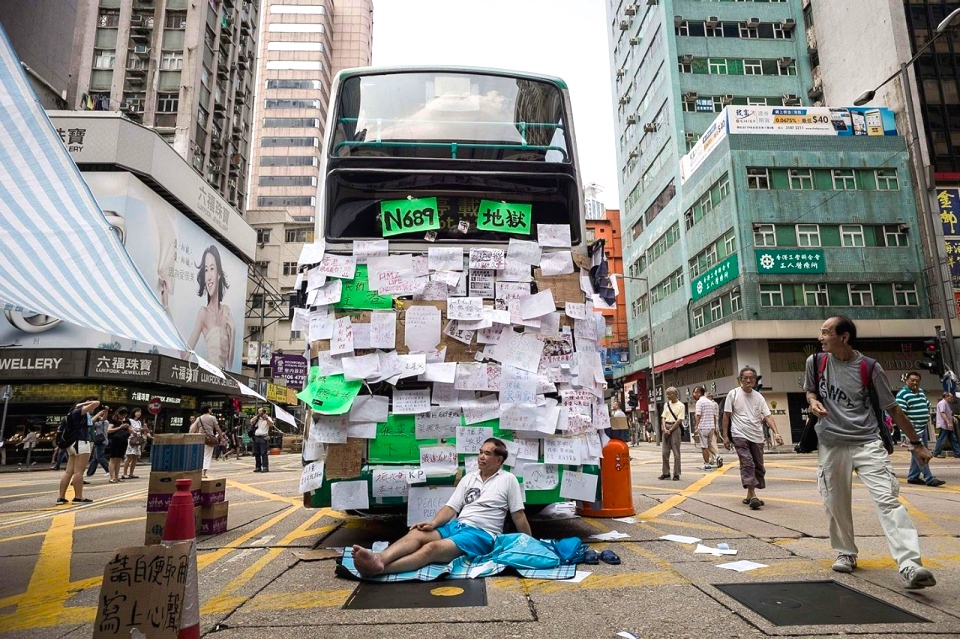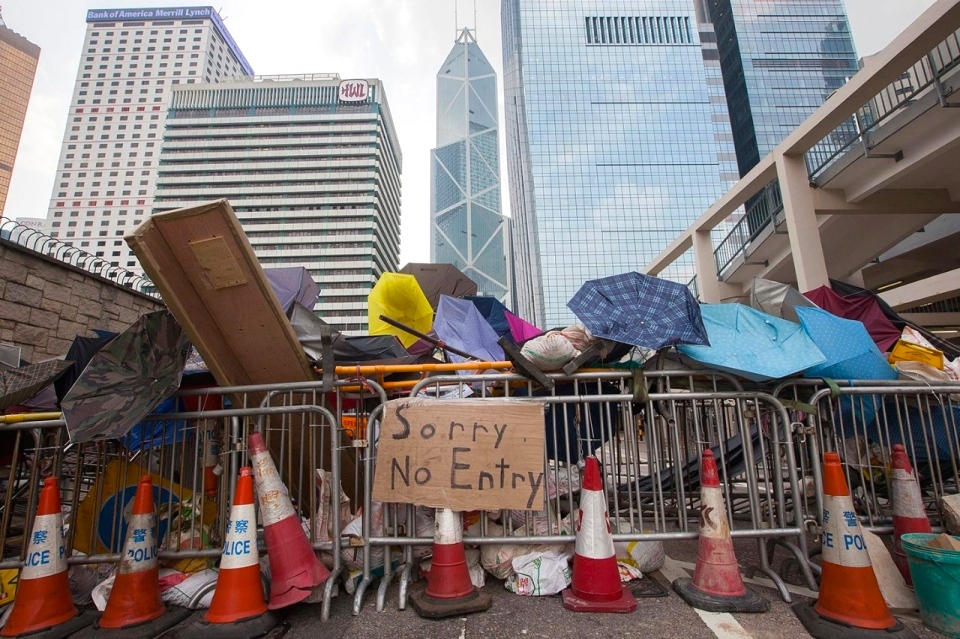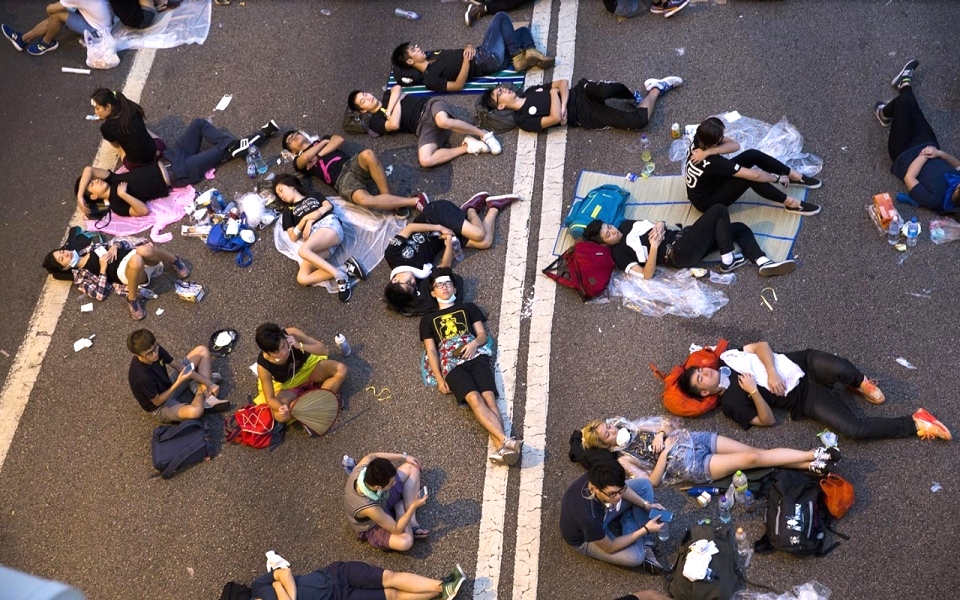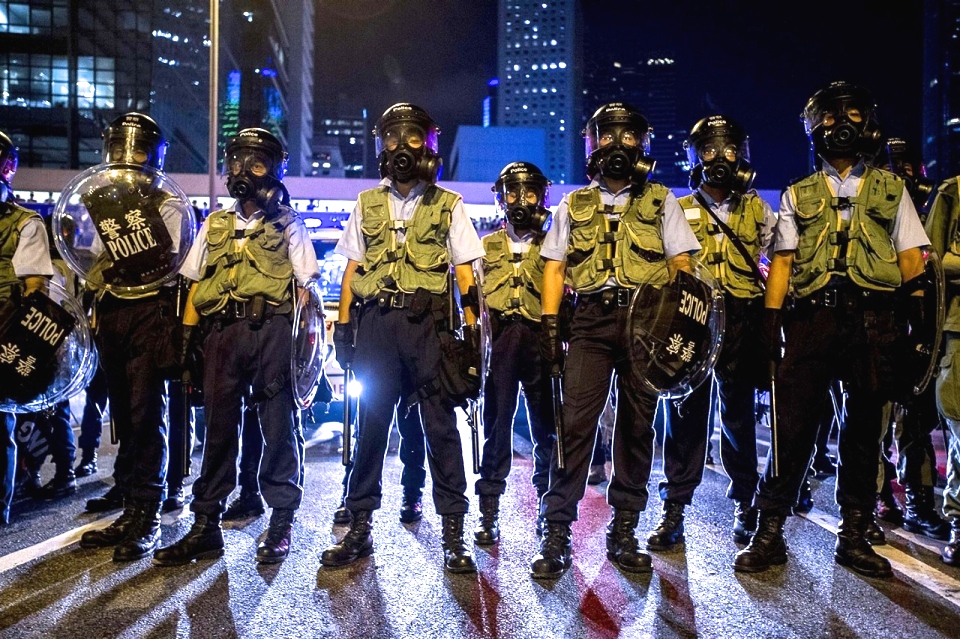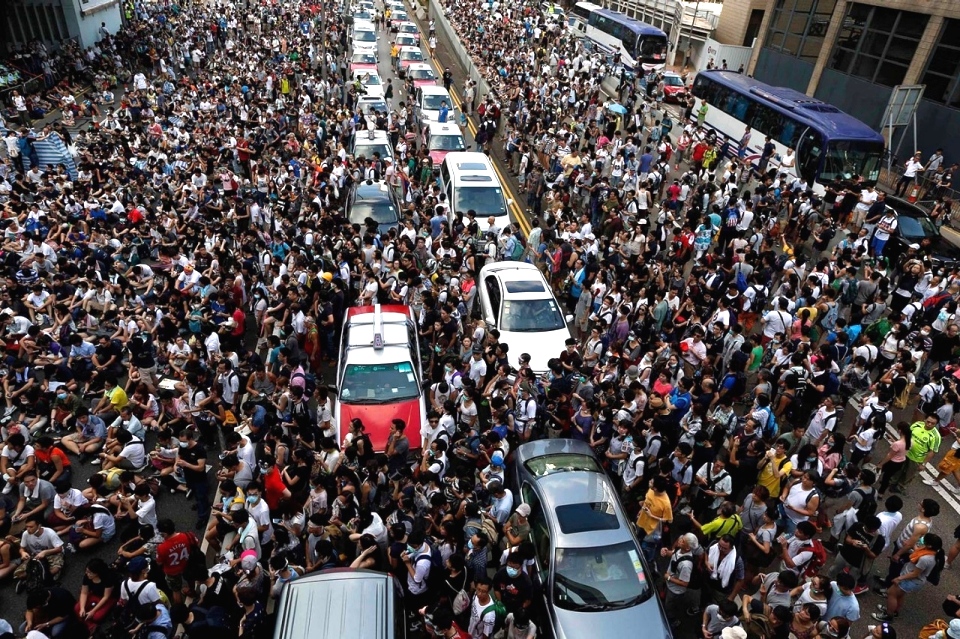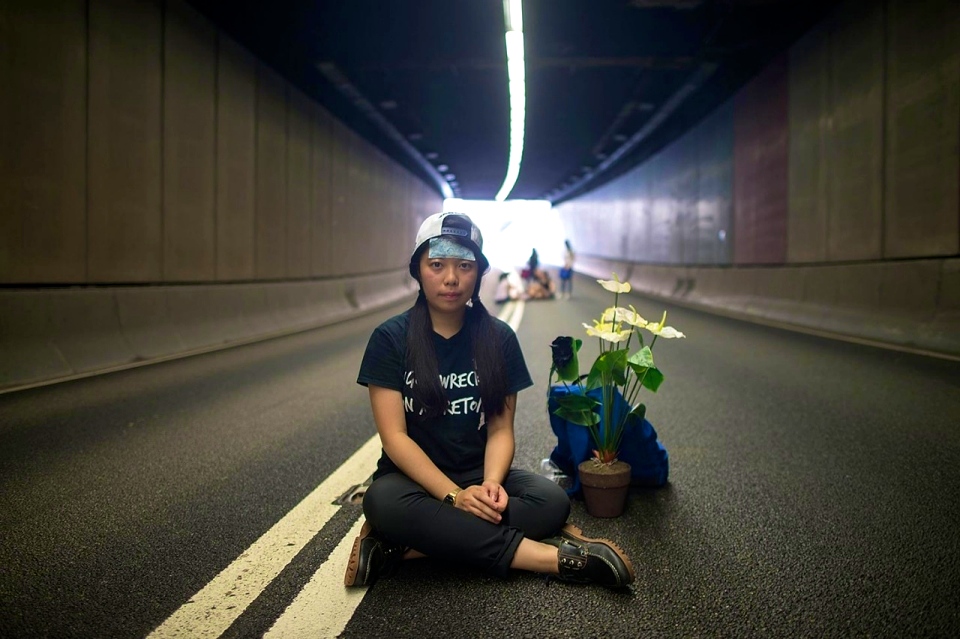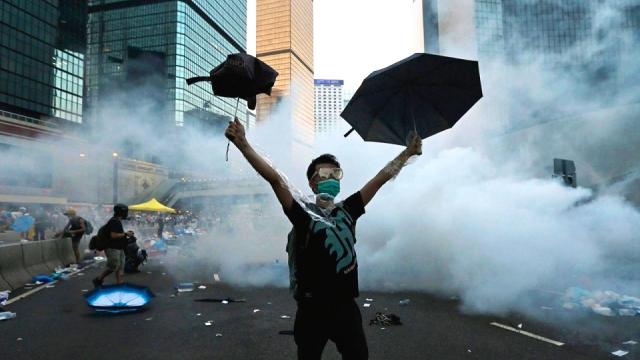
The ubiquitous bad-weather accessory that has come to symbolize Hong Kong’s growing pro-democracy protest movement came in handy on Tuesday night when a brief cloudburst rolled over the city. The rain failed to clear the tens of thousands of demonstrators cramming highways and flyovers, filling sidewalks and storefronts, gathering in pairs and large groups, or merely floating between them all – theirs, after all, is a self-styled Umbrella Revolution.
“Hong Kong, add oil,” they chanted – an exhortation to try harder in the local idiom. And, calling out the city’s Beijing-appointed chief executive Leung Chun-ying by his initials, the protesters chanted “C.Y. step down.”
But the authorities have shown no inclination to yield, and with each passing day, economic damage and political pressure – as well as the prospect of more confrontational protest tactics – increases the chances of a more aggressive government response.
“I believe in the power of the people,” said Sophie Chan, 24, a social worker who has joined the protests after business hours each day since police and protestors clashed last Sunday. She had been surprised by the violence used against the young demonstrators, and blamed Leung, who she said had failed the people of Hong Kong. “We want to support the students and I don’t trust C.Y. Leung to demand democracy.”
The protests this week have drawn attention to two generations of frustrated Hong Kong residents. On the front lines, students have been proactive, staging strikes and organizing occupations of public spaces. Their actions have outpaced the responses of an older contingent of pro-democracy activists, who some younger activists say are too conservative or risk-averse. But while age may indicate some differences in strategy and tactics, there’s more accord on the demand for Leung’s ouster since last weekend’s clashes.
Leung took power in 2012 after securing a majority of votes from Beijing’s 1,200-person electoral committee. But for many Hong Kong residents, Leung has come to symbolize the subordination of their democratic choices to Beijing’s dictates, and calls for his resignation have resonated far beyond the young activists who launched the protest campaign.
“I came here to support the students but also because I want C.Y. (Leung) to step down,” said a 79-year-old protestor who identified himself as Mr. Chan (no relation to Sophie). Tuesday was Mr. Chan’s second visit to the protest site since Sunday, and he was attending Tuesday night’s rally with his children and grandchildren. “We only want what was promised to us, but the government won’t even engage with us.”
The spark for the current protests was lit on August 31, when Beijing confirmed it would vet all candidates for Leung’s position in the 2017 election. The Chinese leadership’s insistence on restricting who could stand for election was denounced as a betrayal of the promise of democracy in the territory that formed part of the 1997 agreement to restore China’s sovereignty in Hong Kong after 156 years of British colonial rule. That prompted Occupy Central’s leader, Benny Tai, to proclaim a new “era of civil disobedience” in the form of strikes, sit-ins, and a myriad of demonstrations throughout the autumn.
But last Friday, after a week of strikes, students planned to occupy the Legislative Council grounds —a small patch of land known, fittingly, as Civic Square. Finding the location blocked by police, 150 protestors scaled the outer walls of the compound in an attempt to enter the government building. In response, and with television cameras rolling, the police deployed pepper spray, arresting 13 protestors, and leaving as many as 50 protestors stranded inside the gated square.
“I couldn’t believe it was happening,” said Jason Coe, 30, an American doctoral student of comparative literature at Hong Kong University whose students were involved in the Friday night incident. “I’ve seen protests before, of course, but who would expect this, especially for Hong Kong.”
It was this sense of surprise that dictated the tone and steady escalation of hostilities throughout the weekend. New protests were catalyzed, and witnesses saw Hong Kong’s latent tensions drive ever-larger crowds into the streets.
“This has been building up over the past several years,” said Chloe Lai, a volunteer media activist who was born and raise in Hong Kong. “Beijing has alienated themselves from the general public, and they are pushing us to the streets.”
Further clashes followed on Sunday, as protestors flooded into major thoroughfares stopping traffic, and police used tear gas and pepper spray to disperse them. Police action did not deter the protesters, and their numbers appeared to grow as more Hong Kong residents joined them, angry at the response by the authorities.
“Now that they have hurt the students, we have to be here,” said the 79-year-old Mr. Chan. “But even if they hadn’t, what we’re doing here is for our future generations. Hong Kong was built by the people and everyone has a responsibility to save it.”
The protests have drawn together two separate, but increasingly aligned pro-democracy groups: the student movement —which includes Scholarism, which is made up of high school students, and the Hong Kong Federation of Students— and Occupy Central.
Occupy Central’s co-founder, Benny Tai, an associate law professor at Hong Kong University, admitted that students had “beat” his movement on to the streets, but announced an early start to Occupy’s civil disobedience campaign by calling for a march on Sunday morning.
According to some reports, students were upset that Occupy had “stolen the show,” hinting at a potential fissure between the generations of activists. Yet the mood on the streets on Monday and Tuesday suggested that the groups’ unity of purpose was greater than any differences between them.
Occupy Central’s followers skew slightly older and, in the eyes of some, are not as radical as the students – although its credentials are established by its roots in efforts by Hong Kong activists to support the 1989 Tiananmen Square protests on the mainland.
“What we are seeing now is a city-wide civil disobedience movement that has outgrown Occupy Central and even the student groups,” Lai said. “It is not just a sense of dissatisfaction, but a feeling that everything will collapse if we don’t do this now.”
The announcement Monday by Hong Kong’s chief of police that riot police would be pulled from the streets encouraged higher numbers to turn out in the city’s central district, and the crowds have continued to grow ever since.
Tuesday evening, the area around Harcourt Road found first-aid tents and supply stations erected to sustain the protesters, as organizers led them in chants and songs. Printed posters pasted over traffic signs included messages such as “Save Hong Kong. Be International,” and “Don’t Destroy Hong Kong.”
Volunteers wandered through the crowd handing out water, snacks and even ponchos in case the rain returned. Others, carrying large plastic bags, circled back to pick up any refuse.
As far as the eye could see, protestors were content to simply wait – to show, by the force of their presence, how important this movement was for the future of Hong Kong. But in the background, tensions continued to linger, as protestors agonized over when, if ever, they should vacate these re-claimed public spaces as the scale of the disruption caused by the standoff grows, and the danger of confrontation swells.
Early Wednesday, at a ceremony commemorating the 65th anniversary of the People’s Republic of China, Leung issued an appeal for moderation.
“It’s understandable that different people have different opinions on the ideal proposal for constitutional reform, but having universal suffrage is definitely better than not having it. It’s definitely better to have five million people vote to elect a chief executive than 1,200,” he told assembled guests and the media.
But for those already wary of the government's half measures or future promises, struggling – despite its consequences – might be their only option.
“A revolution doesn’t always bring immediate change, and it might even make things worse,” Charlie Lam, 24, a post-graduate student in comparative literature at Hong Kong University. Lam went on to cite Napoleon’s coup that brought an end to the French revolution as an example. “But if we persevere, if we stand true to our demands, we can ensure a better future for the people of Hong Kong.”
[via Al Jazeera America]
3 WAYS TO SHOW YOUR SUPPORT
- Log in to post comments

